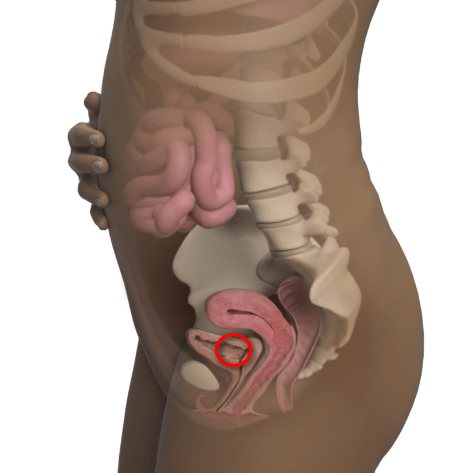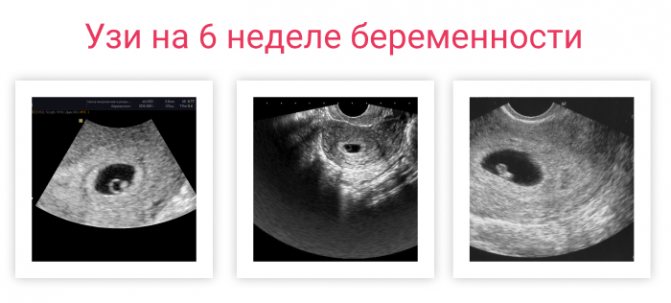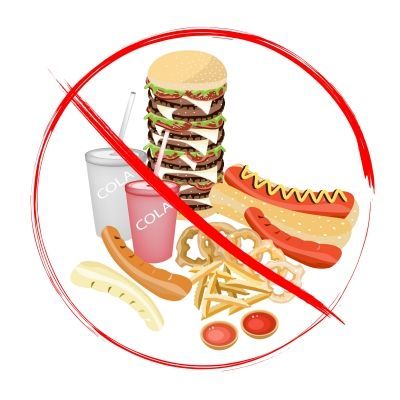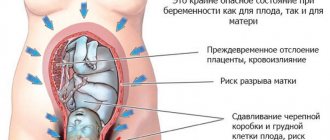Useful Instagram for pregnant women about food and their effect on the body - go and subscribe!
Usually, all doubts are left behind when, after the 5th week, the 6th week of pregnancy begins, and the woman begins to have new pleasant worries. First of all, you need to carefully consider the recommendations for proper nutrition, which is a guarantee of good development of the life that is emerging within. The quality of the baby’s nutrition after birth depends on whether the fetus received the required amount of nutrients and elements during pregnancy.
Changes in the body and their effect on diet
Fetal size at 6 weeks of pregnancy
The appearance of new sensations, sometimes not very pleasant, becomes a direct confirmation of pregnancy. At week 6, they signal that the expectant mother’s diet should help reduce negative manifestations, allowing her to increase her positive attitude.
The fetus during this time period of pregnancy is still tiny, reaching a length of no more than 9 mm and a weight of about 4.5 grams. However, his nervous system is already being formed, a heart is appearing, and other internal organs are being formed. A woman's diet at 6 weeks of pregnancy must include folic acid - vitamin B9. With a sufficient amount of it, the correct formation and further development of all organs and tissues of the embryo occurs.
Folic acid content in products.jpg
Folic acid also plays an important role in the woman’s body during pregnancy. With a lack of this vitamin, she may experience pain in the legs, anemia, and severe toxicosis. It should be noted that there is a fairly extensive list of products that contain this vitamin:
Folic acid in products and tablets
- parsley, lettuce, spinach, asparagus, Brussels sprouts, broccoli;
- wholemeal flour;
- oranges;
- lentils, beans;
- pumpkin;
- green pea;
- apricots, avocados;
- whole grains of wheat, rye, oats;
- melon.
Taking dosage forms of vitamin B9 during pregnancy is prescribed only by a doctor.
6th week of pregnancy
Sixth week of pregnancy
The sixth week of pregnancy is the very period at which most women learn that they will soon become mothers. During this period, changes in the state of the body begin to occur, which are simply impossible not to notice.
Only 5 weeks have passed since conception, but now you should start taking care of your health and the health of your developing baby.
What's happening
At week 6, the first external changes in the body begin to appear: the skin around the nipples darkens, the breasts slightly enlarge, and the sense of smell becomes more acute. The process of hormonal changes in the female body is in full swing.
The embryo begins its most active development. The fruit does not exceed 5 mm in size. At this stage, the child’s nervous system is formed, and the heart and liver are gradually included in their work. An ultrasound can show the baby's heartbeat, which is now 100-150 beats per minute.
Arms and legs have not yet formed, but their rudiments are appearing. The active formation of the face is taking place - now you can already see where the child’s eyes, mouth and ears are located. The inner ear gradually forms, and the body’s immune and muscular systems also develop.
The fetus gains sensitivity by reacting to stimuli from the external environment, but it still lacks hearing. The baby does not yet have bones; in their place for now there are only cartilaginous structures, which will be strengthened in the future, forming bones.
It is still impossible to determine the sex of the future little man, since the genitals have not begun to form. Thanks to the umbilical cord, the baby can move freely in the amniotic fluid.
Feel
The sixth week is not yet long enough for a woman to experience any pronounced sensations. The fetus has not reached the size that greatly affects the condition of the mother.
The main symptom of pregnancy at this stage is toxicosis, accompanied by deterioration of well-being and rapid fatigue. The woman feels tired all the time, often has a desire to lie down and rest, and sometimes suffers from attacks of dizziness.
Mood swings are a natural occurrence during the 6th week of pregnancy. Most mothers become very irritable and capricious, so loved ones need to show maximum patience during this period.
Taste preferences can vary greatly. Foods that a woman previously considered her favorite may now taste disgusting to her, and some foods may now seem incredibly tasty. An increased sense of smell can lead to certain odors causing discomfort, including nausea and vomiting.
During this week of pregnancy, many women face the problem of heartburn, which can get worse after eating certain foods. Constipation is also common at 6 weeks. They arise due to the fact that the uterus increases in size and begins to compress the intestines.
If you experience abdominal pain, especially when it is accompanied by bloody discharge, you should immediately consult a doctor - such a sign often indicates the danger of a miscarriage.
Signs
The main sign indicating a delicate situation is changes in the breasts. She gains increased sensitivity, swells slightly, and the nipple areolas begin to darken.
You may feel a burning or tingling sensation in your chest, as well as pain when touched. Other signs of pregnancy in the sixth week:
- Skin problems. They arise due to hormonal changes in the body. The skin becomes loose, porous, gray in color, and sometimes rashes and pimples form.
- The belly has not yet increased, but the woman’s weight has already increased slightly - no more than 1-1.5 kg. Women with a thin build gain weight much faster than plump women.
- By this week, the uterus has already increased slightly and reached 4-5 cm in diameter. This leads to increased pressure on the bladder and a more frequent urge to urinate.
White discharge is a natural phenomenon. Green, brown or yellowish discharge should be cause for concern, especially if it has a sharply unpleasant odor. This almost always indicates the development of an infectious disease and will require immediate referral to a gynecologist.
Recommendations
To ensure that pregnancy at this stage proceeds as smoothly as possible, you must adhere to the following rules:
- Change your diet. You need to eat fractionally, in small doses, 5-6 times a day.
- Drink more fluids. Replenishing water reserves in the body is very important, since a lot of fluid is lost during vomiting, which is characteristic of this stage.
- Take special vitamin complexes. A lack of certain vitamins or substances during pregnancy, especially C, D, E and B12, as well as folic acid, can lead to disturbances in the development of the fetus.
- Get plenty of rest. You need to go to bed earlier, do not sit for hours at the computer or TV. You should also not overload your body with excessive work.
- Avoid stress. For a woman during this period, the emotional state is very important, which affects the development of the baby.
- Don't refuse sexual intercourse. If there are no contraindications, you can continue to have sex.
- Use perfume as little as possible and avoid strong chemical odors.
If you have pets, you will need to reduce contact with them to a minimum. It is easy to contract toxoplasmosis from animals, which is not at all dangerous for an adult, but can pose a serious threat to a developing baby.
Source: https://moeditya.com/pregnancy/6-nedelya-beremennosti
Menu for 6 weeks of pregnancy
When shaping nutrition, expectant mothers should understand that all recommendations about a balanced and healthy diet are aimed at benefiting both her own body and the unborn child. The restrictions that are inevitable when you are 6 weeks pregnant are not excessive. This is explained by the fact that there remains a fairly extensive list of types of products recommended for consumption, from which a varied and tasty menu is compiled every day.
Proper nutrition during pregnancy
If you want sweets, and sugar is strongly discouraged by your doctor during pregnancy, you can replace it with fruits - bananas, pears, apples or berries. You should select varieties from nearby regions, since during long-distance transportation, fruits ripen on the road, and various chemical additives protect them from spoilage.
Be sure to include fresh or steamed vegetables in your diet during pregnancy - cucumbers, tomatoes, cabbage, zucchini, potatoes. Vegetable oil is used as a dressing; preference is given to olive varieties (why?). We must not forget about hygiene. All vegetables are not just washed with running water, but also doused with boiling water at the end.
Banana ripeness
Meat dishes are allowed during the 6th week of pregnancy, excluding lamb and pork. Among the permitted types are domestic lean poultry, veal and beef (features, recipes), and rabbit. Cooking methods are changing towards the use of a double boiler, oven, as well as boiling and stewing techniques. Sea fish is included in the menu.

Mercury content in fish and shellfish
Porridges such as rice and buckwheat, which are boiled with the addition of milk, are considered mandatory for daily consumption.
During pregnancy, fermented milk products are included in the diet, helping to normalize the functioning of the digestive system. Among the drinks, fruit and berry jelly, fruit juice, and compote will bring the greatest benefit. If you prefer vegetable juices, you need to take them in small quantities due to their high concentration. You can mix several types of juice, for example, carrot, cabbage and asparagus.
For an expectant mother in the 6th week of pregnancy, you can offer an approximate menu, which will explain the principle of its preparation in order to rationally select dishes and products based on five meals:
- A glass of freshly prepared juice, toast with butter.
- Vegetable salad with herbs, weak tea (we write about the “correct” tea for pregnant women here).
- A boiled egg, a slice of rye bread with a thin layer of butter, a glass of kefir.
- Mashed potatoes with boiled meat, fruit, a glass of fermented baked milk, Varents or kefir.
- Boiled fish with a side dish of rice, vegetable salad, weak tea.
Diet for pregnant women
Miscarriage at 6 weeks
The sixth week of pregnancy is considered a risky period due to the possibility of miscarriage. Even the slightest illness can cause this terrible event.
Causes of miscarriage:
- colds, ARVI, angina pectoris, flu, etc.;
- too high body temperature (above 38 °C);
- increased physical activity;
- genitourinary system infections;
- stress;
- chronic and hereditary diseases;
- taking antibiotics, strong composite and other drugs.
Symptoms and signs of miscarriage:
- brown vaginal discharge;
- sharp aching pain in the lower abdomen;
- pain in the lower back;
- menses.
We recommend Pregnancy and coronavirus (COVID-19)
You should be aware that you may experience menstruation at this stage of pregnancy. However, this is the exception to the rule and occurs very rarely. If a woman notices discharge that closely resembles menstruation, it is recommended that she see a doctor as soon as possible. The altered hormonal balance provokes an increase in the growth of lactic acid bacteria in the vagina. This is why normal, non-worrying discharge should be whitish or clear, without any particular color or odor. If the color of the discharge changes, the discharge is greenish, brown or yellow in color and has an unpleasant odor, the woman most likely has an infection in her body. Very often, pregnant women encounter so-called thrush. This is not dangerous for the child, but very unpleasant for the mother; the symptoms of this disease are profuse light discharge that looks like curd flakes and redness, as well as swelling of the mucous membrane, accompanied by a burning sensation and itching. Many pregnant women try to combat this problem on their own, but you should keep in mind that most thrush medications are not recommended for use during the first trimester.
Preventive measures against miscarriage:
- stay positive;
- do not think about bad things and fight bad thoughts;
- Avoid stressful situations and take care of your health from an emotional point of view.
If you smoke, quit quickly. The first trimester of pregnancy is the most risky; smoking can cause miscarriage or premature birth. Try cutting down on the amount of coffee you drink for two reasons. Firstly, caffeine increases toxicosis. Secondly, coffee is a strong diuretic drink that negatively affects the stomach of the expectant mother. Coffee interferes with iron absorption, which prevents the iron from being absorbed into your body the way it should be absorbed. The first trimester is a rather difficult period, because most drugs are strictly prohibited from being taken at this stage. Therefore, the expectant mother should be very careful when it comes to her health and try to be safe. If something goes wrong, any cold that the mother had early in pregnancy can lead to complications and even miscarriage. This can also lead to impaired fetal development and complications that complicate the course of pregnancy and the birth process. Any medications that the expectant mother takes must be prescribed by a doctor.

During this period, I increasingly want to go to the toilet. Photo babycenter.com
How does the diet differ from week 5?
If we compare nutrition during pregnancy, we can note that week 5 is characterized by frequent manifestations of early toxicosis. If these attacks become painful, then it is advisable to limit the consumption of animal proteins, replacing meat with nuts and increasing the percentage of fruit and vegetable components of the diet. Whole milk, which can cause nausea, is replaced with homemade yogurt (benefits and harms) or low-fat cheese.
Symptoms of early toxicosis depending on the severity of vomiting
During pregnancy, at the 5th week, the diet changes towards fractional meals. By eating small meals several times a day, you can reduce the suffering from toxicosis.
By the 6th week of pregnancy, a specific awakening ritual takes shape. Without getting up, you need to chew a rusk or cracker, and then carefully sit up in bed and drink weak tea. Before going to bed, it is recommended to eat some washed and scalded raisins. During the day, you must remember to drink purified water.
Medical examination
With the onset of the 6th week of pregnancy, you can already register with the antenatal clinic, where you will immediately be referred for tests and ultrasound examinations.
Visit to the gynecologist
At the initial appointment, the gynecologist will collect anamnesis, feel the abdomen, look at the gynecological chair and keep a medical record. The examination will be followed by:
- prescription, if necessary, of a vitamin-mineral complex;
- referral for testing, with a focus on hCG levels.
- book your next appointment.
The tests that the doctor will order are mandatory:
- a general urine test is necessary to determine whether there is protein, since this factor can have an undesirable effect on the course of pregnancy, as well as other impurities;
- hospital complex - detailed blood test. Here you will see the level of sugar, cholesterol, general blood test, as well as antigens, hepatitis, etc.;
- blood for hCG levels, which will indicate the stage of pregnancy;
- swab for purity level.
Ultrasound
Ultrasound examination (ultrasound) of the pelvic organs is prescribed if blood tests, urine tests and external signs go beyond the limits of the indicators. If the indicators are normal, an ultrasound may not be performed. However, in order to prevent unwanted deviations, it is better to undergo an examination. Moreover, at this stage it is possible to hear the fetal heartbeat.

Nutrition rules
Every woman, having convinced herself that a long-awaited pregnancy has occurred, is able to draw up for herself a list of rules governing her nutrition in the 6th week.
Avoid unhealthy foods and products, which include the following:

You should avoid fast food during pregnancy
- fried foods;
- marinades, smoking, pickling;
- hot seasonings and sauces;
- fatty meat, fish, lard;
- sausages, canned food (what's wrong with them?);
- rich meat broths;
- carbonated drinks;
- strong tea or coffee;
- fresh and sweet pastries, sweets;
- alcohol.
Reduce salt and sugar intake to a minimum.
Buy only fresh products.
Try not to overeat, as you don't want to gain extra pounds. It is recommended to eat five to six meals a day in small portions during the 6th week of pregnancy.
In the evening after dinner there should be at least three hours left before bed. If you feel hungry, it is permissible to drink kefir, chew dried fruits or eat an apple.
You should not fast during pregnancy. When traveling or at work, it is advisable to always have water, fruit, and light sandwiches with you.
All dishes must be brought to full readiness. You should not eat soft-boiled eggs or undercooked fried eggs during pregnancy. This will avoid intestinal infections that have a harmful effect on the fetus.
Pregnancy 6 weeks
Some dietary features
It’s good if the pregnancy proceeds without any particular complications, but this is not always the case. There are a number of unpleasant symptoms characteristic of week 6 that can be mitigated with the right attitude and nutrition.
Signs of early toxicosis
Due to early toxicosis, the expectant mother experiences severe nausea with salivation and intolerance to certain odors. To cope with this condition, during pregnancy, in addition to breakfast in bed, you need to adhere to a number of simple rules:

Consequences of insomnia during pregnancy
- chew food slowly;
- prevent the feeling of hunger;
- take vitamins recommended by your doctor;
- drink a decoction of dried apricots with prunes;
- suck a lemon drop;
- walk more often or ventilate the room;
- when waking up, tune yourself to a positive perception of reality, avoiding gloomy thoughts and negative forecasts;
- be sure to get enough sleep.
Often, at 6 weeks of pregnancy, expectant mothers feel a strong desire to constantly eat salty foods. Experts warn against indulging in such whims, since excess salt during pregnancy has an adverse effect on the heart, overloads the kidneys, and increases blood pressure.
Sometimes during pregnancy, women experience constipation at 6 weeks. Adding prunes, dried apricots, boiled beets, and figs to your daily menu will help you cope with them. To avoid excessive gas formation, it is advisable to eat bran bread less often.
If such a reaction to certain types of foods such as heartburn occurs, Almagel, which is recommended during pregnancy, should always be in the home medicine cabinet.
A mixture of vegetable (carrots and beets) juices in a 1:2 ratio helps increase hemoglobin during pregnancy. It must be taken into account that beet juice, due to its biological activity, should be drunk a maximum of half a glass per day.
Rosehip decoction during pregnancy will help cope with swelling
It is not drunk in its pure form, but is taken in combination with other vegetable juices. It is better not to take it immediately after squeezing, but to let it stand in the refrigerator for about two hours.
Edema is caused by sodium salts in food. If during the 6th week of pregnancy there is a frequent manifestation of swelling of the limbs and the appearance of puffiness on the face, then it is necessary, after consultation with a doctor, to take diuretic compounds. This could be herbal tea or weak tea with a lemon drop.
Excess salts must certainly be removed, so the problem cannot be ignored.
What differences in nutrition will there be at 7 weeks of pregnancy?











